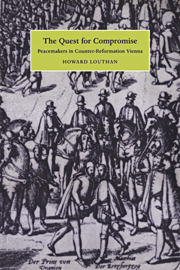Book contents
- Frontmatter
- Contents
- List of illustrations
- Acknowledgments
- A political and cultural chronology
- List of abbreviations
- Introduction
- PART I THE EMERGENCE OF AN IRENIC COURT
- PART II MAXIMILIAN II AND THE HIGH POINT OF IRENICISM
- Introduction
- 3 Hugo Blotius and the intellectual foundation of Austrian irenicism
- 4 Ordering a chaotic world: the reformation of the imperial library
- 5 Protestant ecumenism and Catholic reform: the case of Johannes Crato
- 6 Finding a via media: Lazarus von Schwendi and the climax of Austrian irenicism
- PART III THE FAILURE OF IRENICISM
- Conclusion: Storm clouds on the horizon: from the great milk war to the Thirty Years War
- Epilogue: The wider circle of irenicism
- Select bibliography
- Index
- CAMBRIDGE STUDIES IN EARLY MODERN HISTORY
6 - Finding a via media: Lazarus von Schwendi and the climax of Austrian irenicism
Published online by Cambridge University Press: 03 December 2009
- Frontmatter
- Contents
- List of illustrations
- Acknowledgments
- A political and cultural chronology
- List of abbreviations
- Introduction
- PART I THE EMERGENCE OF AN IRENIC COURT
- PART II MAXIMILIAN II AND THE HIGH POINT OF IRENICISM
- Introduction
- 3 Hugo Blotius and the intellectual foundation of Austrian irenicism
- 4 Ordering a chaotic world: the reformation of the imperial library
- 5 Protestant ecumenism and Catholic reform: the case of Johannes Crato
- 6 Finding a via media: Lazarus von Schwendi and the climax of Austrian irenicism
- PART III THE FAILURE OF IRENICISM
- Conclusion: Storm clouds on the horizon: from the great milk war to the Thirty Years War
- Epilogue: The wider circle of irenicism
- Select bibliography
- Index
- CAMBRIDGE STUDIES IN EARLY MODERN HISTORY
Summary
At first glance Lazarus von Schwendi does not seem to fit into the collage of irenic humanism hitherto depicted. He was neither a great artist nor a scholar. As a youth he was disposed to the more boisterous aspects of student life, and as an adult he composed his most important writings not in polished Latin prose but in a simple and direct German idiom. The path he chose in service of the Habsburgs was not one of letters or erudition. Instead of the pen he took up the sword. This Schwendi, the patriotic military leader and theoretician, captured the interest of nineteenth-century German historians. These scholars portrayed him as a proto-nationalist, a prophetic statesman who saw beyond the confessional rivalries of his day by articulating the common interests of the German Vaterland. But with the decline of political history in the twentieth century, Schwendi's work and thought lost the prominent position it held in fin-de-siècle central Europe. Only in the past decade has attention swung back to this intriguing figure who can now be considered in a new light.
Though a former generation of historians highlighted Schwendi's military background, he was very much a product of the late humanist world of central Europe. His father who died in 1524 entrusted his son's care to the mayor and city council of Memmingen. The boy was first sent to Basle where he studied with the humanist reformer Oecolampadius and Melanchthon's former schoolmate, the Greek scholar Simon Grynäus. From Basle he journeyed to Strasburg. There he worked with Blotius's friend and mentor, Johannes Sturm, who unsuccessfully encouraged him to study law.
- Type
- Chapter
- Information
- The Quest for CompromisePeacemakers in Counter-Reformation Vienna, pp. 106 - 120Publisher: Cambridge University PressPrint publication year: 1997



